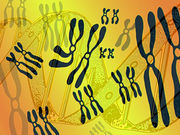TBC1D4 carriers with prediabetes, type 2 diabetes have increased risk of remaining undiagnosed
WEDNESDAY, Aug. 31, 2016 (HealthDay News) — More than one-quarter of Canadian and Alaskan Inuit have the TBC1D4 mutation resulting in elevated postprandial glucose, and those with prediabetes and type 2 diabetes have increased risk of remaining undiagnosed, according to a study published online Aug. 25 in Diabetes Care.
Despoina Manousaki, M.D., from McGill University in Montreal, and colleagues examined the frequency and effect of the TBC1D4 mutation on glucose metabolism and type 2 diabetes diagnosis among Canadian and Alaskan Inuit. Exome sequencing was performed in 114 Inuit from Nunavik, Canada, and Sanger sequencing was performed in 1,027 Alaskan Inuit.
The researchers found that 27 percent of Canadian and Alaskan Inuit had the TBC1D4 mutation, which was strongly associated with higher glucose and insulin two hours after an oral glucose load in homozygote carriers. The odds of remaining undiagnosed were increased for TBC1D4 carriers with prediabetes and type 2 diabetes, compared with noncarriers, unless prostprandial glucose values were tested (odds ratio, 5.4). Thirty-two percent of carriers with prediabetes or type 2 diabetes would remain undiagnosed without an oral glucose tolerance test (OGTT).
“Disruption of TBC1D4 is common among North American Inuit, resulting in exclusively elevated postprandial glucose. This leads to underdiagnosis of type 2 diabetes, unless an OGTT is performed,” the authors write. “Accounting for genetic factors in the care of Inuit with diabetes provides an opportunity to implement precision medicine in this population.”
Full Text (subscription or payment may be required)
Copyright © 2016 HealthDay. All rights reserved.








